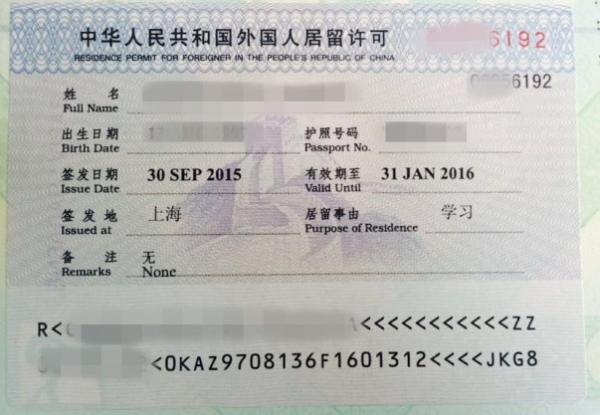Study In China: A Look at Chinese Universities and What You Can Expect
“First of all, my experience of studying in China is quite different from the norm. I came to China when I was 9 years old as my mother was one of the first individuals to receive and accept the Chinese Government Scholarship after it was established with the Ministry of Education in my country. So while she was doing her masters degree, I was attending the nearby local primary school with a typical day a consisting of eating, playing, and sleeping. As I was a foreigner, and my enrollment there was considered experimental (they never had a foreign student before), the Chinese teachers didn’t really bother with me once I didn’t disturb the rest of the class.
It wasn’t until I realized that we would be staying in Shanghai much longer than the ‘6 months or so’ my mother originally told me, that I figured it was time to start paying attention. I eventually picked up the language with ease and spent 6 years in Shanghai before returning home.”
All of this was back in 2000 when life was simple, the air was clean, taxis were few and far between, there were barely any metro lines, and if you told someone you lived in China they would look at you as if you just popped out of an episode of The X Files.
Fast-forward to 2017 and things are very different. Since opening its doors, the process of coming to China has been constantly changing as their relationships with different nations develop. For example, some countries that may have needed a tourist visa in previous years may now have a visa-free agreement. On the other hand, if you plan to study short or long term in China, the process has always been quite clear and simple, and your university should have bilingual staff that are there to help you and provide the most up to date information. Don’t be afraid to send them numerous emails or calls as this can save you a lot of stress in the end. When in doubt I would also suggest contacting your local Chinese Embassy or Consulate for the latest information and requirements.


It’s not as scary as it seems. Here is you will find the tips on how to study in China.
1. What to prepare
When preparing to apply to university in China you need to prepare a bit of everything. It might sound daunting, but it’s not very hard to get. Unlike applying for university in the USA or UK, your foreign certificates in most cases do not need to be verified, notarized or apostilled in order to be accepted at your university. However, depending on the university, any documents that are not in Chinese or English do need to be translated into one of these languages. For most language programs, meaning short term, long-term, intensive, summer etc. usually only the following are needed:
- Passport copy
- Application form
- Application fee
However for degree seeking programs such as bachelors, masters, PhD or credit earning exchange programs, the documents often needed are:
- Passport copy
- Application form
- Application fee
- High school certificate (or highest degree of education)
- CV
- HSK certificate (if the program is taught in Chinese)
- Recommendation letter(s)
- List of published articles/ sample of artwork
- Statement of interest
- Others (depending on the program and university)
Helpful tips:
1) Most Chinese taught degree seeking programs require HSK 4 or above. (Get help with HSK)
2) There may be entrance examinations
3) You may need to provide proof of your English language abilities if your program is taught in English and you are not from a China recognized English speaking country (US, CAN, UK, AUS, NZ, SA, IRE)
- Visa & Resident permit
You will also need a recent medical exam, to supplement your residence permit application. This can either be done in your home country or upon entry to China before starting your program. In my personal experience at Donghua University in Shanghai, I entered China on a student visa and at orientation all new students were told to meet with their documents in a certain room on a certain day, officials from the Entry-Exit Bureau then came to the campus to check and approve all residence permit applications. There were also buses that transported us to the medical check center and back to campus, so we didn’t have to worry about figuring it out ourselves.
Let me be clear on this, the student visa and residence permit are different things. The visa allows you to enter the country and lets immigration know that you are entering for the purpose of studying, the residence permit however always states a purpose and allows you to reside in China for that purpose. So if you are a student your purpose is to study, if you’re working, it’s to work, and so on.

- Program & Scholarships
The Internet is always a good place to start for resources if you’re serious about your desire to study abroad, whether study in China or elsewhere. Look for blogs, Facebook pages, or your university’s website to request a brochure. However, do not be surprised if the English version of the site is not up to date, lacks information, or simply gives an Error 404 with every link, although unprofessional, it is quite common that the site is not maintained very well. The best bet is to find the contact information for the university’s international student department and contact them directly via phone or email. I would also recommend websites such as Study in China to find programs and scholarships.
If you’re hoping to receive financial assistance you will be happy to learn that there are numerous scholarships out there, some are even targeted for specific countries such as the British Council China Scholarship for British passport holders, (and Irish passport holders for Northern Ireland domiciled). There are also various scholarships established by Chinese government, Chinese local governments, Confucius Institute, foreign governments, Chinese universities, and corporations, all dedicated to encouraging educational exchange. I would advise you to pay close attention to the application deadline, submission location, and what the scholarship entails (full/partial). For example, the Chinese Government Scholarship must be submitted in your home country to the entity responsible for applications, which is usually the Ministry of Education or a similar government agency, or the Chinese Embassy/Consulate in your country of citizenship/residency.
2. What to Expect
Studying in China is no different than studying anywhere else, you are expected to attended classes, perform well, complete assignments, obey the rules and regulations of your university, and follow the laws of P. R. China. Illegal scooters, overstaying visas, working illegally, and recreational use of drugs are offences punishable by law and can lead to cancelled visas and/or scholarships, deportation, or even detainment or arrest. One main difference I would say is that students are often treated like high school children. The university where I completed my bachelor`s degree enforced ‘physical education’ for the first 2 years. This meant that we were forced to take a PE class every semester (I personally took yoga, dance, taekwondo and aerobics). We also were required to complete the ‘morning run’, which consisted of running around the campus with other Chinese students, swiping our student cards at both the start and finish line to record our attendance. If you missed too many runs then your overall PE grade would be affected. Absolutely ridiculous, right? Yes, I agree, that’s why I never did it. However, my university said this was their way of ensuring students stayed mentally and physically fit and well rounded, as the majority of them were away from home for the first time in their lives, which I guess makes sense.
Another difference is that we attended classes as a class, rather than selecting courses you were interested in (that also fulfilled your requirements) and meeting other students. Students in my major all took the same classes together, so there was none of that ‘Oh you’re in my Introduction to Criminal Law 101 class right?’ experience, but at least you have about 20+ students you can easily contact to ask for notes instead of trying to make a friend in each course. Also, teachers took attendance; I did say it was like high school did I not? Imagine being in a lecture hall with 40+ students (my major was separated into two groups, class 1 and class 2 with a total of about 45) and you have to sit there waiting for everyone’s name to be called. Miss too many classes and the class monitor would have to report you to the academic advisor who would contact you for a stern talking to. Sometimes being an international student can help because they don’t really bother once you’re well behaved and passing the class, but I know of students that have been placed on probation or lost their scholarships because of low or nonexistent class attendance.
Something notable as well, at least at my university, was that the final exam was everything. There was no extra credit, mid term exam/project, group assignment etc. to help you pull up your struggling GPA. Only the final exam determined whether you passed or failed the course.
In addition, if you’re applying to the same university as your sibling, friend, spouse or significant other, be sure to find out the campus your program is on because it won’t be clearly stated in the name. It is possible that some universities can have campuses all over the city located in very remote university town type areas. If your university has an international student association, which it should, be sure to expect some interesting (and boring) on campus events. If your language skills are good you may even be asked to represent the university on TV or in Chinese competitions like I did. Yeah I got eliminated the first round, but at least I got an all expense paid trip to Beijing for about 2 weeks, met 90+ other students from all over the world that also studied in China, and got to represent my country on national TV.
3. Word of Advice
In the end, China is a lifetime’s worth of interesting all in one place. You could end up studying Chinese in historical Beijing, getting your degree in the freezing mountains of Heilongjiang, then working in bustling Shanghai or exotic Hainan Islands. If you love it, you will find that it is easy to find your place. Graduating from a local university has now made it easier to obtain a work permit, and companies are searching for talented bilingual workers. If you don’t like it, then at least you had the chance to experience it for yourself and have something to share with others back home.





Thank you for writing about this topic. It is very informative for everyone who wants to study abroad.